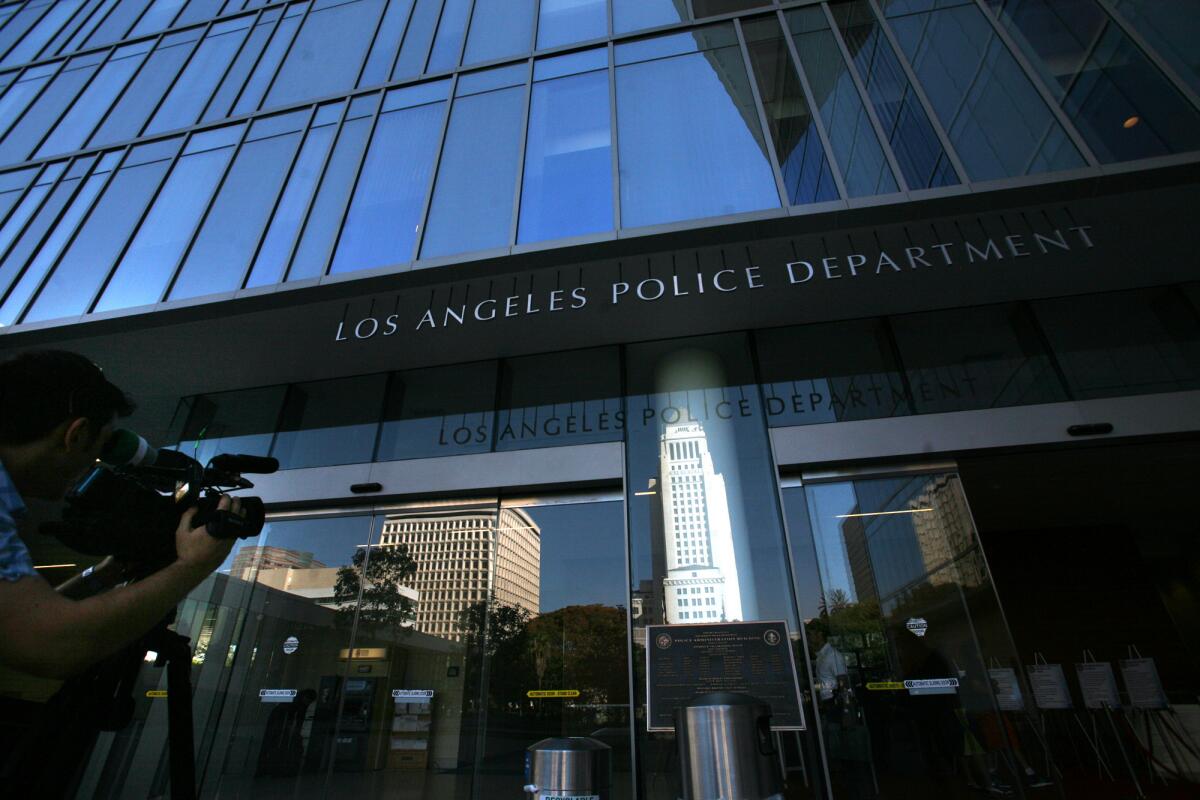Five residents file lawsuit alleging LAPD falsely labeled them as gang members

- Share via
Five residents allege in a lawsuit filed Sunday that Los Angeles police officers labeled them gang members without evidence as part of a broader pattern of corruption that has caused irreparable harm to them and many others.
Citing a growing scandal in which LAPD officers stand accused of lying about gang affiliations on field interview cards, the litigants are seeking class-action status to sue on behalf of thousands of people who they say “have been victims of scofflaw Los Angeles Police Department officers who filed fraudulent reports, lied under oath, and abused gang database systems.”
“We believe there are thousands of people who have been categorized and dehumanized,” said Humberto Guizar, an attorney for the plaintiffs. “A law that was meant to stop gang violence was used incorrectly by the Police Department and subverted to the point where they criminalized thousands of people.”
One plaintiff, Sara Ochoa, alleged she worked as a California corrections officer until LAPD officers in January misclassified her as a gang associate “simply for going back to visit” the East L.A. neighborhood where she grew up.
Guizar said Ochoa, a Latina mother of five, lost her job because of the incident and gang label even though she faces no charges.
“She’s trying to make it out of the systemic cesspool we live in, she makes it out, and then this is what they do to her?” he asked.
A second plaintiff, Jajuan Johnson, alleged that LAPD officers pulled over a vehicle in which he was a passenger, then “blatantly lied in the police report they authored” by contending he was a Bloods gang member.
A third plaintiff, Branden Costa, alleged LAPD officers accused him of a shooting and falsely labeled him as a gang member to bolster their case, even though video surveillance from that day showed he was elsewhere at the time of the shooting and could not have pulled the trigger.
“Although Mr. Costa was acquitted of all charges, the falsely contrived gang identification followed him and has plagued his life every day since, causing him incalculable suffering and damage,” the lawsuit states.
An LAPD spokesman declined to comment on the pending litigation.
The lawsuit, filed in U.S. District Court, represents the latest volley in a scandal that broke early this year and has grown in recent weeks.
Three LAPD officers — Braxton Shaw, Michael Coblentz and Nicolas Martinez — were charged with falsifying records and obstructing justice in a 59-count complaint filed by Dist. Atty. Jackie Lacey’s office last month that alleged they claimed without evidence that people they had stopped were gang members or associates. That case is pending.
Prosecutors said last week that they are reviewing hundreds of criminal cases in which Shaw, Coblentz and Martinez were listed as potential witnesses, to see if they can stand or should be dropped or reopened.
Guizar said Shaw was involved in some of the arrests noted in the lawsuit. Shaw’s attorney has previously said Shaw did nothing wrong and always followed directives from his superior officers.
LAPD officials and prosecutors have also acknowledged that more than 20 additional officers remain under investigation in relation to gang labeling on field interview cards.
The LAPD launched its investigation into field cards last year after a Van Nuys mother learned that her son had been identified as a gang member and challenged the assertion. A review of body-worn camera footage found inaccuracies in what an officer had recorded in relation to her son, and police agreed to remove him from a gang database while they conducted a broader review.
In recent weeks, in response to growing protests over police abuses and calls from activists, LAPD officials announced they would stop adding names to the statewide CalGang database.
Times staff writer Emily Alpert Reyes contributed to this report.
More to Read
Sign up for Essential California
The most important California stories and recommendations in your inbox every morning.
You may occasionally receive promotional content from the Los Angeles Times.











